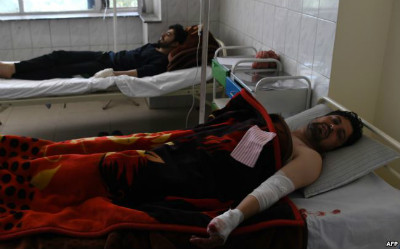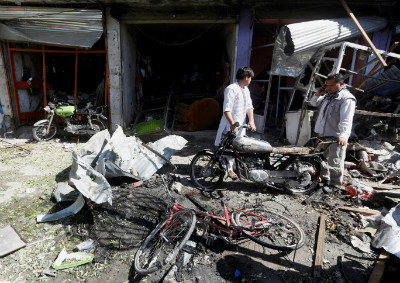At least 35 people have been killed and more than 40 wounded after a suicide car bomb targeted a bus carrying ministry staff in Kabul, the capital of Afghanistan, officials said.
Intelligence officials told Al Jazeera that the bus was carrying staff of the Ministry of Mines and Petroleum when it came under attack on Monday.
The attack happened just before 7am local time (02:30 GMT) and took place close to the house of the deputy government Chief Executive Mohammad Mohaqi, said officials.

Afghan men are treated in a hospital after being injured in a car-bomb attack in Kabul on July 24, 2017. (Photo: AFP)
The Taliban claimed responsibility for the attack in a statement sent to Al Jazeera.
The bus was destroyed, along with three other cars and several shops in the area, said Kabul's police chief spokesman, Basir Mujahed, adding children were among the wounded.
Najib Danish, an acting interior ministry spokesman, added that the casualty toll could rise.
"It was a very loud blast, and my shop is completely destroyed," Baqi Mohammadi told Al Jazeera.
"The Taliban has attacked innocent people. Who has ever benefited from killing innocent people?"
Spokesman Mujahed said the "bomber struck at one of the busiest times of the day".
"There were traffic jams with people going to work and to the university and schools. Many of the shops had just opened," said Mujahed.
Al Jazeera's Jennifer Glasse, reporting from Kabul, said the Hazara community had called a demonstration for Monday to commemorate a suicide bombing that killed 84 in the same area on July 23 last year.
The Hazaras are one of Afghanistan's largest ethnic minorities, accounting for up to 20 percent of Afghanistan's 30 million inhabitants.
The demonstration was postponed because of security risks.
"Security has been very tight in Kabul," she said. "This morning, new barrier gates went up that limit the height of trucks coming into the city."
Hazaras are often the target of sectarian violence in Afghanistan and Pakistan.
One-year anniversary

Shopkeepers survey the damage done to their businesses after a suicide attack in Kabul, Afghanistan on 24 July 2017. (Photo: Reuters)
On Monday, Kabul's Hazara community was due to mark the one-year anniversary of an attack in the capital that killed 84 and wounded more than 300 people, mostly members of the ethnic minority.
That attack was the first in Afghanistan claimed by the Islamic State of Iraq and the Levant (ISIL, also known as ISIS) group, which has since carried out multiple attacks targeting the country's Shia minority.
The latest suicide bombing adds to the unrelenting violence in Afghanistan, where at least 1,662 civilians were killed in the first half of the year.
Kabul is regularly rocked by suicide bombs and attacks. A recent UN report showed that attacks on the capital accounted for nearly one-fifth of all Afghan civilian casualties in the first half of 2017.
Many died in a single devastating attack in Kabul in late May when a truck bomb exploded, also during the morning rush hour, killing more than 150 people and injuring hundreds.
The UN Assistance Mission in Afghanistan put the civilian death toll at 92, saying it was the deadliest incident to hit the country since 2001.
NATO's combat mission in Afghanistan ended three years ago, handing sole responsibility to the country's security forces, which have also suffered casualties as they try to beat back the Taliban and contain the growing threat from the ISIL group.
Kabul has accounted for at least 20 percent of all civilian casualties this year, including at least 150 people killed in the massive truck bomb attack at the end of May, according to UN figures.



